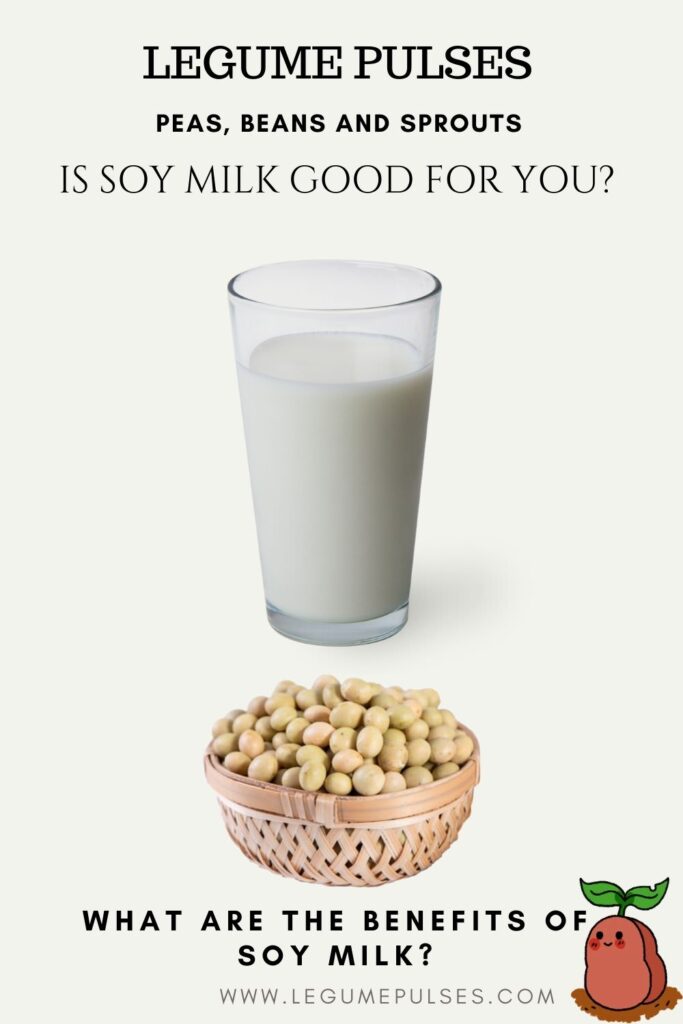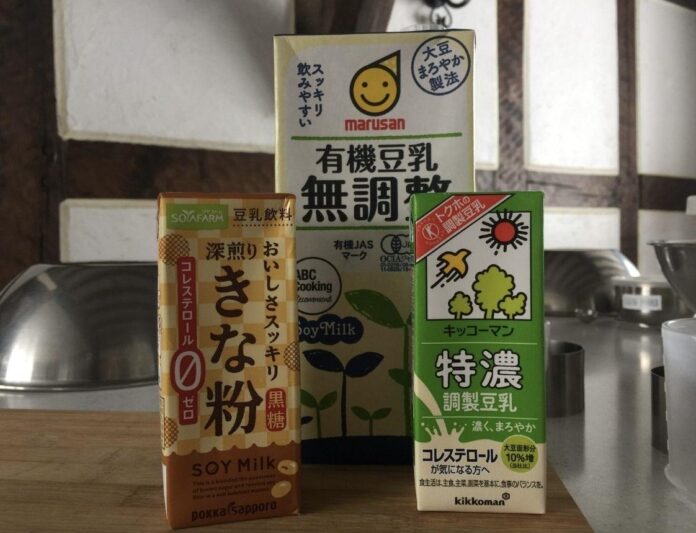Soy has been a staple crop in China, Japan, and other Asian countries since around 3000 B.C. It was named one of the five sacred crops because it is crucial to Asian diets. In Asian cuisine, soy is usually consumed in moderation. But now we can consume a lot in a short amount of time. So should we be consuming so much soy? And we have to ask the question, is Soy milk good for you?
Table Of Contents
- Why is soy milk popular?
- What is soy milk?
- Nutritional comparison between soy and whole milk
- Soy milk benefits
- Adding soy milk to your diet
- Summary, is soy milk good for you?

Why is Soy Milk Popular?
Although soy has long been a staple of vegetarian diets, it was not widely used in the United States until a couple of decades ago. Before then, Americans had to venture to health food stores to buy soy foods. However, that has all changed. Edamame, tofu, miso soup, and soy milk are all widely available on the shelves of American grocery stores.1
Soy consumption has skyrocketed in the U.S. in recent years. In 1996, U.S. sales of soy totaled just $1 billion. By 2013, sales of soy products were up to $4.5 billion, according to the Soyfoods Association of America.2
One of the reasons soy consumption has increased so much is its benefits. Soy provides a complete source of dietary protein. Unlike most other plant proteins, soy contains all of the essential amino acids that the human body needs.3
Soy milk is a great milk alternative for people who are lactose intolerant. Even people who are not lactose intolerant prefer to drink soy milk for health reasons. So, is soy milk good for you?
What is soy milk?
Soy milk is made by blending whole soybeans and filtered water. After the soybeans are soaked in water, the insoluble fiber, called okara is removed. Soy protein is preserved, and minerals and vitamins are added to increase the nutritional density. Natural and artificial flavors are sometimes added depending on the brand.4
Soy Milk Vs. Cow’s Milk Nutrition
So, how does soy milk stack up against regular dairy milk in terms of nutrition? Soy milk offers many nutritional benefits compared to cow’s milk. And there are a few drawbacks as well.
Organic Unsweetened Soy Milk Nutritional Value (Based On 1 Cup)
| Calories 80 | Cholesteral (MG) 0 | Carbs (grams) 4 | Sugars (grams) 1 | Protein (grams) 7 |
| Fat/Saturated Fat 4/.05 | Sodium (MG) .75 | Vitamin D (MCG) DV 15% | Calcium (MG/DV) 20% | Potassium (MG) 350 |
Nutritional Value Of Whole Milk (Based On 1 Cup)
| Calories 149 | Cholesteral (MG) 24 | Carbs (Grams) 12 | Sugars (Grams) 12 | Protein (Grams) 7.7 |
| Fat/Saturated Fat (Grams) 7.9/4.6 | Sodium (MG) 105 | Vitamin D (MCG) DV 30% | Calcium (MG/DV) 21% | Potassium (MG) 322 |
As you can see, soy milk has fewer calories, fat, and sugar than whole milk. However, it provides almost as much protein as whole milk. This makes it a great milk substitute for anyone on a low-fat or low-calorie diet. Because soy milk only has four grams of carbs. It is also ideal for people with diabetes and other low-carb diets.
Cow’s milk naturally has more calcium than soy milk. It also contains more vitamins like vitamin D and B12. Despite these things, soy milk is a good milk alternative — especially for people who cannot have regular dairy milk because of allergies, lactose intolerance, or other issues.
Nutritional Tip: Many brands of soy milk have added sweeteners and flavorings. So, please check the label for added ingredients as these things can alter the nutrition. For the healthiest choice, look for soy milk that is non-GMO and free from artificial flavors and colorings.
Soy Milk Benefits
Soy milk has many nutritional benefits and is an ideal substitute for cow’s milk on many levels. It is an excellent source of protein and is often fortified with vitamin D and calcium. Additionally, soy milk is naturally lactose-free.
Here are some of the other benefits of this milk alternative.
Heart Healthy
Soy-based foods like soy milk are heart-healthy. The American Heart Association says that eating foods containing soy may prove beneficial to heart health, as soy can replace foods with saturated fat.
Soy milk is naturally cholesterol-free and low in saturated fat. It can help lower LDL cholesterol, a primary risk factor for heart disease.
Recent studies have found that soy helps lower LDL or bad cholesterol by approximately three percent.5
May Help Lower Blood Pressure
High blood pressure can lead to stroke, kidney failure, coronary artery disease, and heart failure, along with other health problems. One of the ways to lower blood pressure is to reduce salt in the diet.6
Soy milk has less than 1 mg of sodium per cup. In comparison, standard dairy milk has 105 mg of sodium per serving, so it makes sense that soy milk would help lower blood pressure.
A study conducted by scientists in Spain seems to confirm that hypothesis. The researchers found that chronic soy milk consumption significantly lowered blood pressure in people who had high blood pressure.7
Good Lactose-Free Dairy Alternative
Lactose intolerance occurs when a person cannot correctly absorb lactose. Lactose intolerance can occur as a result of genetic factors or injury. It is estimated that as many as 65 percent of the human population has a reduced ability to absorb lactose. Lactose intolerance is more prevalent among people in certain parts of East Asia, Italy, and West Africa.8
People who are lactose intolerant cannot correctly absorb cow’s milk. They will often experience stomach pain, gas, nausea, and diarrhea between 30 minutes and two hours after eating or drinking milk or milk products.9
Soy milk is an excellent milk alternative for anyone who is lactose intolerant. It is naturally lactose and dairy-free. You can read the benefits between regular dairy milk, skim, and soy milk by clicking the link.
Beneficial For Weight Loss
If you are trying to lose weight, unsweetened soy milk may be a suitable replacement for cow’s milk in your diet. It is low in calories and has fiber, which helps you feel full after a meal. Numerous studies have confirmed that soy is beneficial to weight loss.
Researchers believe that soy helps speed up weight loss by mimicking hormones in the body that reduce hunger. Research by scientists at the University of Illinois found when lab rats were injected with soy protein, they lost weight. Despite having unlimited access to food. The authors of the study suggested that soy acts similarly to the hormone leptin, which signals to the brain that you are full and should stop eating.10
Another research study, conducted jointly by researchers from the University of Colorado, University of Pittsburg, and Dupont Nutrition and Health, studied the effects of a high-protein diet with or without soy-based proteins during both weight-loss and maintenance phases.
A total of 71 overweight or obese adults were assigned to one of two experimental groups during this randomized clinical trial. Control subjects were given a high-protein diet that did not include soy-protein products.
While the experimental group ate a high-protein diet that included three daily soy-protein products. The researchers found that subjects who consumed the soy-based diet lost as much weight as the control group. Therefore, they concluded that incorporating high-protein soy-based foods into a weight-loss plan can help improve body weight, body composition, and cardiometabolic health. 11
Beneficial For Your Skin
One of the most often overlooked benefits of soy milk is its possible effects on the skin. Soy has been long used in beauty products like body washes and face creams. That is because soy contains phytochemicals that fight against wrinkle damage.
A study from Japan found that daily consumption of fermented soy milk helps to improve facial wrinkles in post-menopausal women. In the study, healthy Japanese women were randomly divided into two groups.
- One group consumed one bottle of fermented soymilk per day.
- And a control group that did not.
The researchers found significant improvements in the amount and average depth of wrinkles for women in the control group who did drink soy milk. These findings suggest that drinking soy milk can improve facial wrinkles. 12
May Reduce Diabetes Risk
The American Diabetes Association recommends plant-based proteins like soy in a diabetic meal plan. Soy provides quality protein, fiber, and healthy fats for diabetics. Researchers have found that eating soy-based foods helps improve glucose tolerance and decreases blood glucose levels in people with diabetes.13
Ways To Add Soy Milk To Your Diet
Sure, you can always drink plain soy milk. It comes in numerous varieties, including sweetened and unsweetened, chocolate and vanilla. There are many other ways to add soy milk to your diet. Simmer it with your favorite soup. Add it to the blender and make a smoothie.
Almond milk is another popular choice as a dairy milk substitute. And you can read a comparison between soy and almond milk by clicking the link.
Is soy milk good for you?
Numerous studies conclude that soy milk is good for you. And if you are diabetic or want to lose weight, soy could be a good option.
And we have to keep in mind the possible nourishing benefits to our skin. The skin is the biggest organ in the human body and is something we shouldn’t neglect.
Soy milk is an excellent choice to replace dairy milk because of its high protein content. Soy milk often has calcium and minerals added to increase the nutritional value and is the best alternative to dairy milk.
References:
- https://www.ncbi.nlm.nih.gov/pmc/articles/PMC1480510/
- http://www.soyfoods.org/
- https://www.ncbi.nlm.nih.gov/pmc/articles/PMC1480510/
- https://silk.com/products/learn-more/about-soymilk
- https://my.clevelandclinic.org/health/articles/17491-soy-foods
- https://www.mayoclinic.org/diseases-conditions/high-blood-pressure/diagnosis-treatment/drc-20373417
- https://www.ncbi.nlm.nih.gov/pubmed/12097666
- https://ghr.nlm.nih.gov/condition/lactose-intolerance?fbclid=IwAR3ieNdYfndFXtlgwPdJQ9GNXpmg3JFJ72mDKtLPvyVBWUNOskKcazLim5o#statistics
- https://www.everydayhealth.com/digestive-health/milk-allergy-vs-lactose-intolerance.aspx
- https://www.sciencedaily.com/releases/2007/05/070501115010.htm
- https://www.ffhdj.com/index.php/ffhd/article/view/412/717
- https://www.ncbi.nlm.nih.gov/pmc/articles/PMC6105701/
- https://www.sciencedaily.com/releases/2009/10/091006120510.htm







